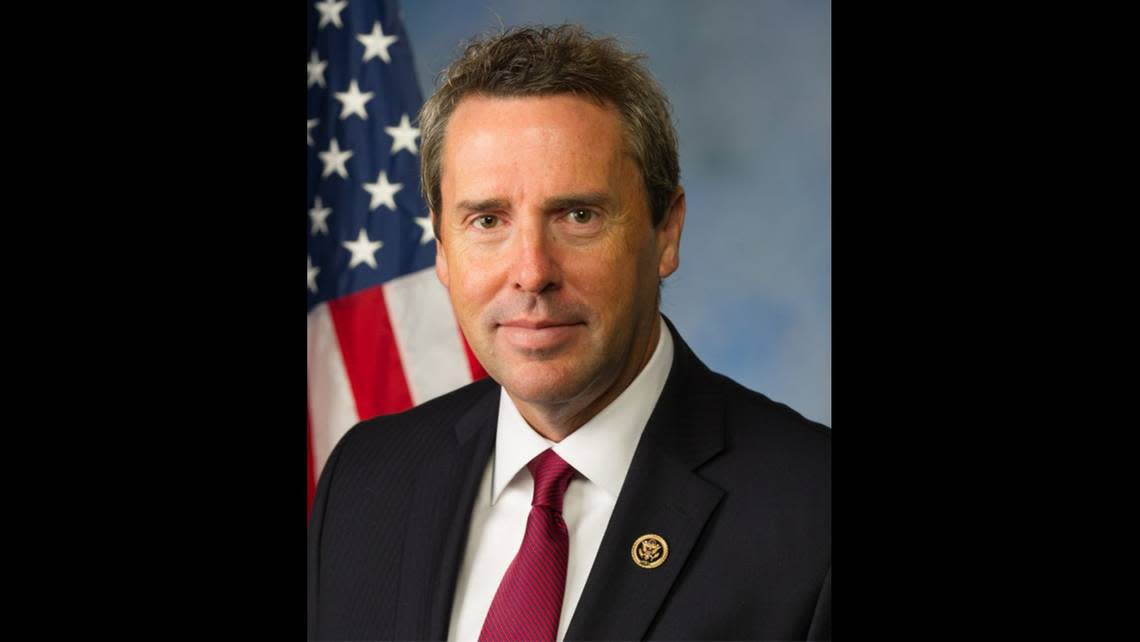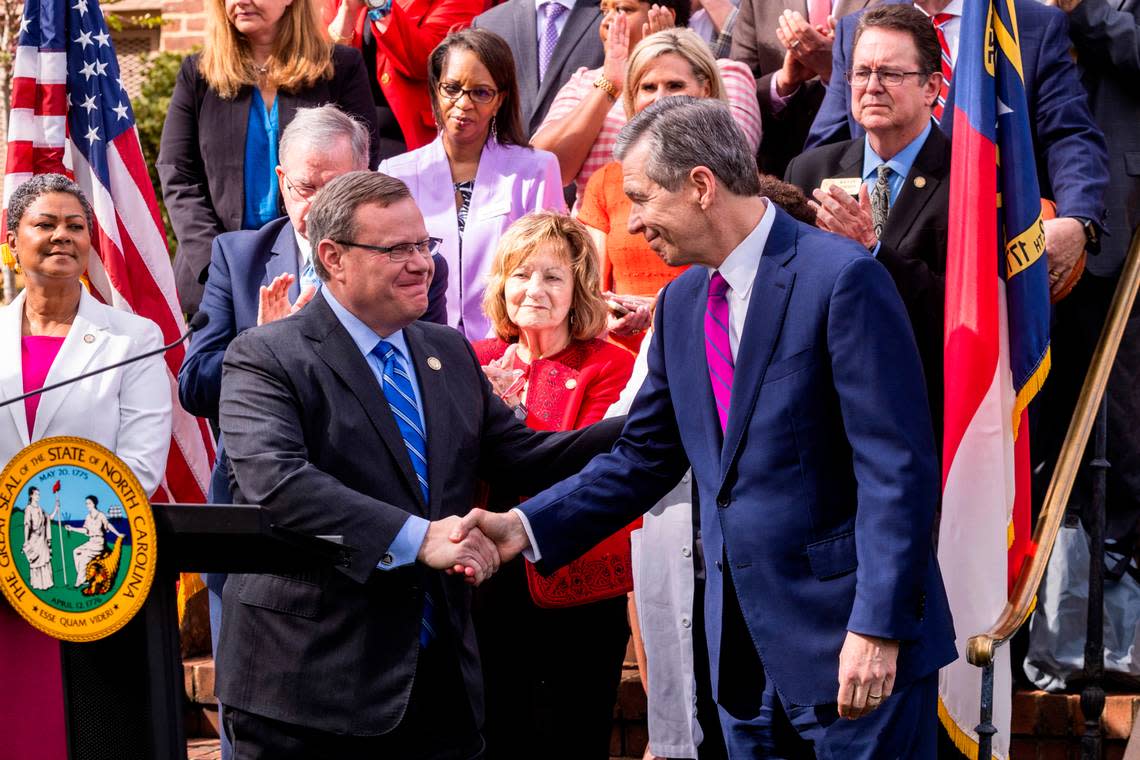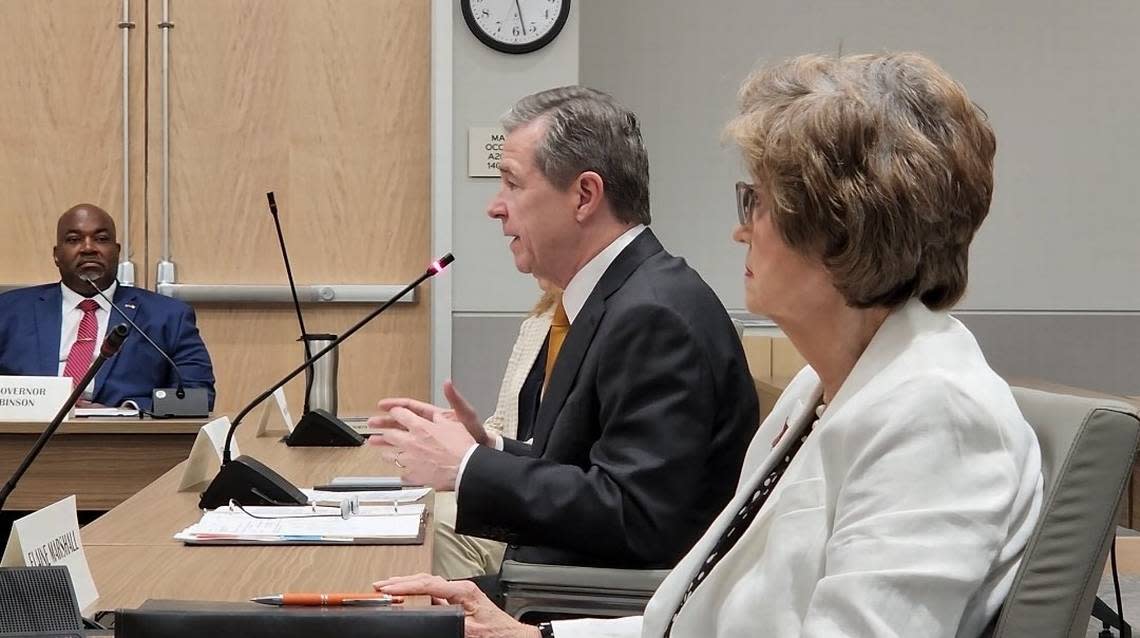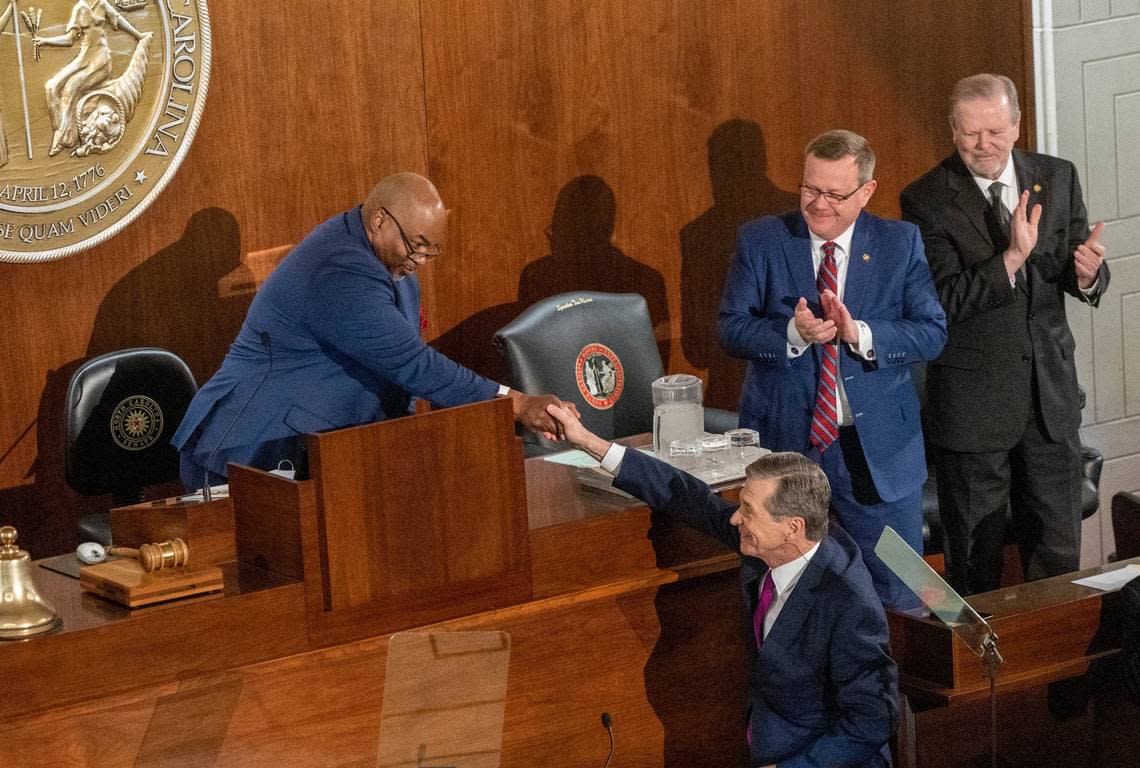NC elects a new governor in 2024, but the office is being weakened by the legislature
Legislation stripping more of the governor’s powers shows that the Republicans who dominate the legislature are “drunk on their power,” says a Democrat running for governor in 2024.
And he’s not the only candidate voicing concern about the push to take away more authority from the job they want to hold.
“Those (bills) are a perfect example where the legislature is saying: ‘We’re not only going to be the legislature and make the laws, we’re going to run the executive branch, we’re going to run state government,” Attorney General Josh Stein said. “That’s not how our system of government is designed.”
“We all learn about it in elementary school. We separate powers, because power corrupts, and that is bad for the people of North Carolina going forward,” Stein said.

Senate Bill 512 would take appointment power from the governor on several boards and commissions and give it to other officials. The bill is likely to either pass into law on its own or show up in the stalled state budget. Either way, the move could end up in the courts, Republicans have said.
Lawmakers would give themselves some of the appointments — drawing from recommendations by the House speaker, Tim Moore, a Kings Mountain Republican, and the Senate president pro tempore, currently Phil Berger, an Eden Republican.
Former U.S. Rep. Mark Walker, a Republican candidate for the job, sees some overreach in the legislation, according to his campaign manager.
“Walker looks forward to working with the General Assembly as governor however, there are areas where he believes the Senate is overreaching, particularly certain appointments that are now designated by the Senate President Pro-Tempore,” said Jonathan Bridges, who is Walker’s campaign manager.
“Mr. Walker believes it’s important to hold sacred the separation of powers between our three branches of government,” he said.
Walker won his congressional seat in a heated race against Berger’s son in 2014, in which Walker attacked the senior Berger for his role in the campaign.

Another Republican candidate, State Treasurer Dale Folwell, said that even with pending legislation putting more limits on the office, “the governor of North Carolina is still the CEO of the largest business in this state.”
“The governor of North Carolina is responsible for employing more people, buying more light bulbs, more gallons of gasoline, more paper towels than anyone else in the state. And that is true yesterday, that is true today, and that’ll be true tomorrow. Regardless of what legislation passes,” he said.
The power of the governor
The office of the governor in North Carolina doesn’t come with a lot of power — at least not compared to other states. Governors can’t veto parts of a bill without axing the whole thing, and veto power itself is only a generation old.
And regardless of whether a Democrat or Republican occupies the Executive Mansion in Raleigh, the Republican-dominated General Assembly has been working to take even more power away.
But there’s still a lot of power in the office, even if much of it comes from the public perception of the state’s spokesperson.
It was Democratic Gov. Roy Cooper who went on CNBC this month announcing that the business channel had picked North Carolina as the best place to do business in the country. So the governor may take the credit, and blame, for what the state does.
Governors are elected statewide, while the two other most powerful politicians in the state — the Senate president pro tempore and the House speaker — are elected by their districts, and then their caucuses elevate them to the power positions.
For more than a decade, those two positions have been held by Berger and Moore, who now lead veto-proof supermajorities in their respective General Assembly chambers.
This session, the supermajority has overturned Cooper vetoes, passing new laws that include restricting most abortions after 12 weeks and repealing the requirement to get a permit to buy a handgun.
And legislation still under consideration would give the General Assembly even more power — taking away some appointments to boards and commissions from the governor’s office.
What candidates for governor say
Past legislation from Republicans has directly affected Cooper, but now, with Cooper limited from running for a third consecutive term, any new laws would impact the next governor.
Stein previously served in the state Senate, and Folwell, who as treasurer is on the Council of State with Cooper, is a former House member. The apparent frontrunner in the Republican primary, Lt. Gov. Mark Robinson, presides over the Senate as president of the chamber.
Asked why he wants to be a governor that has been losing some powers, Stein said the state is at a crossroads and he’s “very concerned about the path the Republican legislature and my likely opponent, the lieutenant governor, would carry this state forward.”
“I certainly hope that the voters restore some balance here at the General Assembly and at least break the supermajority so that there’s compromise — because I believe we are at our at our best when we compromise. These folks want it my way or the highway, and that’s bad for North Carolina.”
Stein said when he was in the Senate, “I don’t remember passing any laws that took power away from the governor, and gave it to the legislature. Because there’s enough. There’s enough. The legislature has enough power.”
“And what they are doing is getting drunk on their power,” he said. “And it’s just about accruing and accruing more and more. And over the long term, it’s gonna cause a great deal of damage.”

Folwell doesn’t oppose the legislation.
He said that after serving in the General Assembly and the cabinet, “I have very little concern about how these, the change in these appointments, is going to affect the outcome of what these boards’ responsibilities are.”
Robinson’s office did not respond to a voicemail and emails from The News & Observer for this story. He has rarely been at the legislature during Senate sessions over the past few months.
Less power by design
A bipartisan group of five former governors wrote a letter in April sharing their disapproval of the latest powers legislation, The N&O previously reported. Former Republican Govs. Pat McCrory and Jim Martin and former Democratic Govs. Bev Perdue, Jim Hunt and Mike Easley all signed the letter.
“We fear that it would inflict real chaos and harm upon the people of our state,” they said.
Western Carolina University politics professor Chris Cooper said that the governor’s office has always been weak compared to the rest of the country.
“The only question is whether North Carolina’s governor is the 49th or 50th most powerful governor in the country. They’re just weak by design,” he said.
“We were 100 years later than every other state to give the governor the veto power. That’s not an exaggeration. And then, of course, the appointment power ... has been reduced even further,” Cooper told The N&O.
He listed off how North Carolina compares: It is one of only six states without line-item veto power, and it doesn’t allow veto power over redistricting or local bills, which makes it “essentially the weakest veto in the country.”
However, the governor gets to be the face of the state, he said, and has a bully pulpit.
“People think you have power, even though you don’t. Which is just really interesting, right? And so what that means is that your rhetoric still carries the same weight that it would in a state with a powerful governor. It’s just that you can’t back up that rhetoric with access to the real levers of legislative power, like you can in other places,” he said.

2023 law limiting governor powers
During the coronavirus pandemic, Folwell was a frequent critic of the governor’s handing of the state’s response, specifically not bringing the rest of the Council of State into decisions as he made a long series of executive orders restricting people’s lives and businesses over more than a year. Folwell also objected to Cooper not holding the meetings of the council, which also include the secretary of state, labor commissioner and statewide schools superintendent, in person.
In an interview Monday, Folwell again highlighted what he described as a “lack of transparency” in decision-making by Cooper. A new state law this year requires the governor to get more approval from the rest of the Council of State, and in some cases the General Assembly, for lengthy executive orders during states of emergency.
Asked if he supports the new law, Folwell said “you don’t need the law to tell you what’s right and what’s wrong. And I believe that today as the treasurer and I will believe that as the next governor of North Carolina.”
Folwell said what North Carolina needs is a “department of common sense,” that would think outside the box when it came to COVID-19 response and restrictions and including the Council of State.

Chris Cooper, the politics professor, said it’s not just Republicans who have wanted a weak governor’s office compared to other states. Democrats are living in a glass house, he said, considering what happened when they controlled the legislature. The most powerful elected officials in the state, he said, are the House speaker and the Senate leader.
“When the Democrats were in power they weren’t wild about gubernatorial power, either. It’s Roy Cooper (as a state senator) that was the primary sponsor of the bill that gave the governor the veto. So he drew up a veto that did not give redistricting power for example, to the governor,” he said.
State Rep. Marcia Morey, a Durham Democrat, said that “power begets power,” and that even if Democrats did something when they were in power, “it doesn’t make it right.”
“I think it’s interesting, the Republicans are the party of less government, but we’re seeing many bills come in: ‘We want more power. We want the legislature to appoint judges. We want the legislature to take away the governor’s appointees on the board of elections, the Board of Education, give it more to the legislature.’”
“I think our separation of powers is important. The governor is elected by all people throughout the state,” she said.
Moore, the Republican House speaker, told reporters in June that “it was clearly contemplated and spelled out in the constitution that the legislative branch was to have the most authority because it’s the closest to the people.
“I mean, we only what, in the 1990s, even gave the governor a veto. Which, by the way I’d like to roll that back if we could, but that’s not going to happen,” Moore said.

